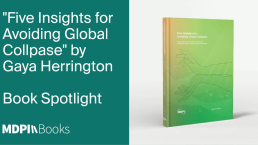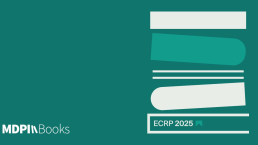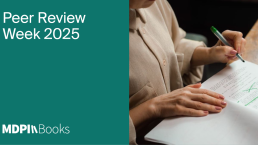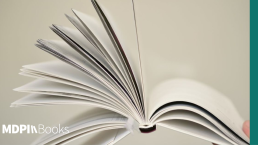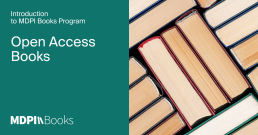
Introduction to the Books Program: Open Access Books
Unlike reprints, open access books are what most of us think of when we hear the word ‘book.’ In this first part of our Introduction to the Books Program, we’ll take a closer look at what open access books are, the history of MDPI’s Open Access Books Program, the kinds of services we offer our authors and editors, our business model, and some of the challenges we face.
What are open access books?
Open access books contain original material and are not collections of reprinted articles from our journals.
Our open access books have flexible formats to accommodate the needs of our authors. This is because the publication of our books is more complex compared to journals.
Although open access indicates a similar process for both books and journals, the transformative nature of our books allows for continued interdisciplinary collaboration.
In short, the Open Access Books Program is designed not to replicate the journal content, but to complement it.
History of MDPI Books Program
Although the MDPI Books initiative launched in 2014, we began publishing regularly in 2019. The launch of our SDG book series, also known as the Transitioning to Sustainability series, marked the beginning of this journey.
Our Books Program is defined by exploration and experimentation, with subjects ranging from biology to public healthcare to engineering.
Book types come in many forms. We currently focus on short-form or full-length monographs (including extended doctoral theses), edited books, textbooks, project reports, academic anniversary books, and conference poster books and handbooks.
The most common types of books we publish are monographs and edited books. A monograph is a specialised work that focuses on a single subject, topic, or theme. In contrast, edited books are a collection of chapters that are curated and carefully overseen by an editor to ensure cohesion within the final contents.
Services for authors and editors
We use a variety of services to ensure the content we publish is widely accessible. Here’s a full list of the services MDPI Books offers:
- Convenient online submission and manuscript tracking via our system JAMS
- Pre-check using iThenticate
- Personal administrative support from an experienced Book Editor
- Quality assessment coordination among editors, authors, and external reviewers
- Formatting, English editing, and typesetting
- Unique cover design
- DOI assignment at the book and chapter level
- ISBN assignment at the book level, print, and online
- Marketing and promotional services
- Licensed as CC BY and/or CC BY-NC-ND – authors retain copyright
- Print-On-Demand
- Database indexing on OAPEN, DOAB, WoS, Clarivate Book Citation Index, etc.
In addition to personal support and industry-standard services like iThenticate, all of our books are submitted to Crossref and receive a unique digital object identifier (DOI). Subsequently, this allows authors and users to precisely identify and access academic books and scholarly materials.
The licenses we use enable authors to retain copyright and, depending on the specific license chosen, allow scholars to redistribute, reuse, and sometimes even adapt the content.
In terms of indexing, our open access books are currently indexed on the platforms listed above. These platforms, such as OAPEN and DOAB, play an important role in enhancing the visibility of open access books. We also index with Clarivate and the popular search engine Google Scholar to further extend the reach of our open access books.
Additional services
MDPI Books offers authors the option to include additional services in their contract. Let’s take a look at some of these additional services:
- Figure editing to revise and format charts, graphs, and illustrations to guarantee the books are visually pleasing. This includes figure size, resolution, colour, font, labelling, and conversion of the file formats.
- Authors can choose to include a book index at the end of their text to enable readers to more easily search for specific content and themes. This should not be confused with the database indexing included in our standard services.
- Extensive English editing involves changes to grammar, spelling, punctuation, phrasing, and clarity of expression.
- Comprehensive formatting and typesetting include major adjustments to formatting, references, sources, and figure descriptions.
- Extensive marketing services including a virtual book launch and social media promotion.
Our business model
MDPI Books follows the model of MDPI journals, generating revenue through processing charges–in this case book and chapter processing charges rather than article processing charges–and the sale of print editions using digital print-on-demand technology. However, as an open access publisher, revenue expectations from print copy sales are limited.
The processing charge for an individual chapter is 1200 Swiss francs., and book processing charges (BPCs) are calculated based on page count and selected services.
The BPC generally ranges from 9,000 to 12,000 Swiss francs for a book of no more than 350 pages.
This funding model contributes to the sustainability of open access publishing. However, we are also looking into alternative models as a funding source.
Challenges of open access books
The open access models developed for journals cannot be directly applied to books.
With books, submission, peer review, and editorial processes are less standardised than in journals.
Also, reviewers generally need to be familiar with various and broader subjects to be open to assessing longer, more in-depth scholarly works, and they must adjust their evaluation criteria accordingly.
Reviewing a book is time consuming. As a result, we offer reviewers a minimum of 4 weeks for each book and often require 2 rounds of review and revision.
Additional challenges for open access book publishing include the higher cost and the limited funding sources. Since open access books are not as well established as journals, there are fewer funds dedicated to support the publication in comparison to journals.
Book authors may also want to work with publishers that specialised or are at the top in their fields. Open access books generally need to be commissioned by a specialist. Manuscripts submitted without going through the proper channels likely won’t have the necessary funding or will not contain the necessarily rigorous academic content we aim for.
We’re here to help answer any questions
For any inquiries about our Books Program, please don’t hesitate to contact us via our web page.
Additionally, check our website and FAQs first in case the answer to your question is there.
Ready to publish your open access book? Read our guide on publishing your academic book as open access. After you’ve read our guide, submit a book proposal with MDPI Books.
This article was transcribed from a video by MDPI Books’ Project Manager Evan Escamilla.

